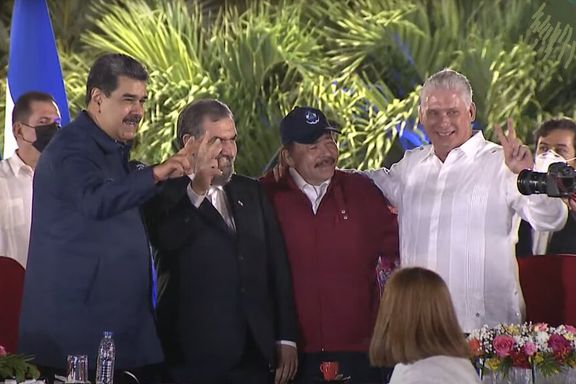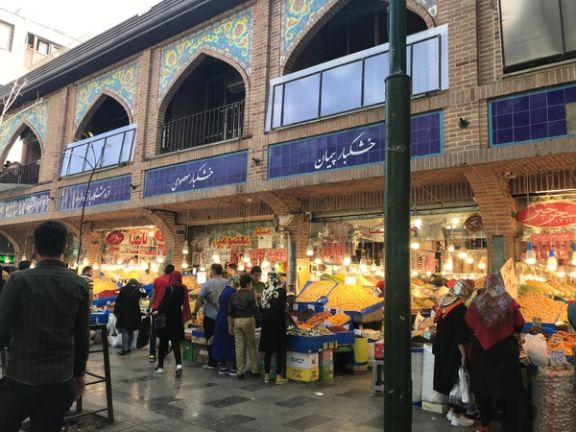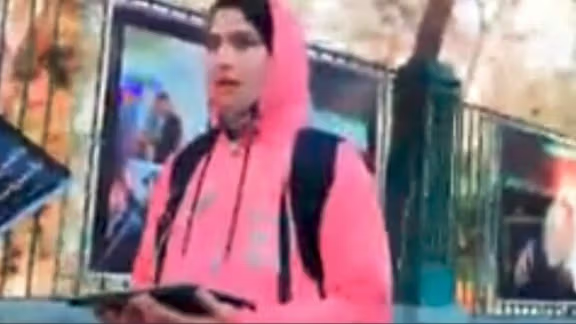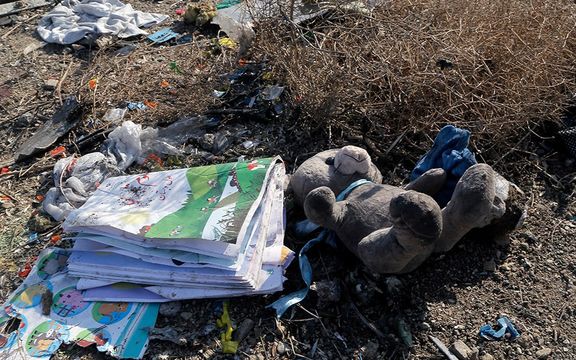Argentina Slams Presence Of Indicted Iran Official In Ortega Inauguration

Argentina is outraged over the presence of a top Iranian official implicated in a 1994 terrorist attack in Buenos Aires, in the inauguration of the new Nicaraguan president.

Argentina is outraged over the presence of a top Iranian official implicated in a 1994 terrorist attack in Buenos Aires, in the inauguration of the new Nicaraguan president.
Argentina’s Foreign Ministry said on Tuesday that the presence of former IRGC commander Mohsen Rezaei, who is currently Iran’s vice president for economic affairs, at the inauguration of Daniel Ortega is an insult to the victims of the bombing of the Jewish center in Buenos Aires.
The ministry called it “an affront to Argentine justice and to the victims of the brutal terrorist attack″ in the Argentine capital that killed 85 people in 1994.
The Argentinian government itself is under criticism by people and the opposition for allowing its ambassador to attend the investiture of a president who won his fourth consecutive term in a purportedly rigged election and is accused of gross human rights violations, and for being at the same event with Rezaei.
Fulvio Pompeo, a senior official of the opposition party PRO, said that the government was not only ″being partners with dictators and human rights violators in our region″ but also acting as ″accomplice″ to an organizer of the terrorist attack.
Rezaei, along with several other Iranian officials, is wanted by Argentina on an Interpol “Red Notice” because of the bombing of the Jewish center, which was carried out in cooperation with Hezbollah.

A new report about the Iran's economic growth prospects for the current fiscal year, forecasts a 6.2% “real” GDP growth in the most optimistic, and 3.4% growth in a pessimistic scenario.
The report is produced by the Iranian Parliament Research Center, which is not one of the official economic reporting organs of the state.
The International Monetary Fund (IMF) has estimated about 2.5% real GDP growth for 2021 and 3.4% growth for 2020, after a 12.8% cumulative economic contraction during 2018 and 2019.
Iran will need years of much faster growth just to return to the point where it was in 2017.
These figures represent the total value in 2010 “constant prices” of final goods and services produced within a year, disregarding current inflationary prices and the fall in the value of the national currency.
Regarding the increase in both oil production and exports in the current Iranian year, the real GDP growth is reasonable, but not to the level that could compensates the 12.8% economic contraction in 2018 and 2019.
The data intelligence company, Kpler, has estimated Iran’s crude oil and gas condensate exports to have reached 620,000 barrels per day in 2021, which indicates almost 100% growth year-on-year. The figure was 2.5 mb/d during pre-sanctions era.
OPEC also estimated that Iran’s crude oil production has increased to 2.4 mb/d in 2021, about 400,000 b/d more than in 2020. The figure was 3.8 mb/d during the pre-sanctions era.
Iranian Parliament’s Research Center says the oil sector has experienced 9.9% growth in the first half of current fiscal year and may continue in this pace and possibly climb 18% for the whole year, in an optimistic scenario.
The real face of the economy
The “real” GDP growth is a method to compare GDP in a specific period with a corresponding period in the past, without measuring inflation and fluctuations in the value of a country’s currency.
But, the average annual inflation rate in Iran during 2018-2021 was about 35%. On the other hand, Iran’s national currency has lost most of its value, plunging from below 50,000 rials/1 US dollar to 250,000 rials/1 USD during this period.
Both IMF and the World Bank updated their estimations in late 2021 about Iran’s nominal GDP, based on the “current prices” (with measuring inflation).
IMF’s calculation says Iran’s nominal GDP, based on the low “official” USD rate (42,000) has almost doubled since 2017 and reached about $835 billion in 2020, but the World Bank says it declined from $445 billion in 2017 to $203 billion in 2020, based on the USD rate at Iran’s open currency market.
Considering the fivefold difference between official and open market currency rates in Iran, the huge gap between the two estimates is quite reasonable.
Iran’s government plans to eliminate the low “official” dollar rate that the IMF has used. This rate was applicable only to controlled imports of essential goods, such as food and medicine. It is not clear why IMF made its calculations based on this rate. Therefore, it is expected that the IMF will adjust its calculation and put the country’s nominal GDP at a level, close to World Bank’s estimated figure.
In this case, Iran’s nominal GDP with 83 million population, equals half of United Arab Emirates’ and one-third of Saudi Arabia’s or Turkey’s GDPs.

A student interviewed by Iran’s state-run TV on the downing of an airliner in 2020 says her words were doctored to support the official account of the incident.
The video report in which university student Shaghayegh Amiri appeared was shown by the state-run television (IRIB) on the anniversary of the downing of a Ukrainian airliner on January 8, 2020, by the Revolutionary Guards (IRGC). Speaking to local media Tuesday, she said the airing of the vox-pop has caused her great pain because what she appeared to be suggesting in the report was not what she had actually said.
The report consisted of a succession of fast-paced sentences chosen from interviews with young people in Tehran streets. The answers were arranged in a way as to suggest that they all agreed that the decision by the missile operator to shoot down the plane was logical.
The IRGC, which after three days of denial finally admitted that it had downed flight PS752 with two missiles, maintains that the operator of the air defense system mistook the plane for an enemy missile and made a hasty decision to shoot it down to save lives.
Many Iranians, including most of the victims' families, believe that the IRGC intentionally shot down the plane. Such suspicions are reinforced by the fact that the tragedy occurred only hours after the Guards fired more than a dozen missiles at bases hosting American troops in Iraq in retaliation for the US targeted killing of Qods Force Commander Ghasem Soleimani just days earlier.
The young student said many among her family and friends who are not aware of the circumstances in which the interview took place are upset with her that she made remarks contradicting her own beliefs.
In her own defense, Amiri claimed that the interviewers used various tricks to manipulate her and her companion to say what they wanted to hear from them to suit their scripted scenario and heavily edited the footage they had taken to remove what did not fit the script.
According to Amiri, the IRIB reporters approached her as she was waiting for a friend on the street and told her they wanted to ask some questions for a program on the occasion of the second anniversary of the tragedy that killed all 176 onboard the commercial flight.
"They gave me a tablet and asked me to play a video. In it you saw a red spot on a radar screen which indicated danger and you had to decide whether to shoot at it or not … 200 people would be killed if you shot at it and if you didn't, 5,000 lives would be lost. You had to decide [fast] which was more logical, the killing of 200 or the death of 5,000," Amiri said about the circumstances in which the interview took place. She accused the interviewers of insisting that she say she would fire at the plane if she were in a position to have to make a decision.
Amiri said that she challenged the interviewers and pointed out that the first missile shot at the Ukrainian plane may have been fired by mistake, but a second missile was also fired. "I asked them what justified the firing of the second missile. But none of this was included in the video shown on television," she said.

An Iranian lawmaker has sent a written warning to the sports minister, warning him against common manipulations in the elections of federation chairmen.
Abbas Moqtadaei, who is the deputy chair of the national security committee of the parliament, said on Tuesday that repeated delays in holding the election in the gymnastics federation have put it under the threat of suspension by international institutions.
He said that engineering the results of elections in sport federations has always been a problem in the country, and it is also reported under the current minister.
The elections in federations of boxing, shooting, basketball, taekwondo, skate, and some others have also caused controversy in recent months.
The mismanagement in Iran’s sport sector is not something new and has caused numerous problems for the sport community of the country, with many athletes leaving Iran to play for other countries.
Recently, the Asian Football Confederation (AFC) barred three top Iranian football clubs, including Persepolis and Esteghlal, from participating in the 2022 Asian Champions League tournament.
The AFC did not elaborate on the exact reasons behind the decision but said the clubs failed to meet the required licensing regulations that include issues such as timely submission of their documents or unpaid membership fees.

Iran’s hardline Kayhan daily has lashed out at news outlets for publishing an interview with the family of two victims who died in the downing of an airliner, saying they have a pro-US agenda.
During the interview, parents of two victims had said that the airliner was shot down deliberately to prevent possible US retaliation in the wake of Iran's missile attack on US bases in Iraq on January 8, 2020.
In an article titled "Revenge against the Revolutionary Guards on behalf of the United States”, Kayhan lodged an attack Tuesday against reformist outlets Ensaf News and Sharq newspaper, saying they want to create a poisonous atmosphere about the downing of the airliner.
The article said Mohsen Asadi-Lari, a former high-ranking health ministry official, and his wife Zahra Majd who lost both their children, misquoted remarks by Revolutionary Guard (IRGC) officials in their interview.
The bereaved parents, who broke their silence after two years, said IRGC officials had told themthat a war with the US could have happened if the plane was not shot down. "They say if the plane was not downed a difficult war would happen the next day. The US would have attacked, and ten million lives would be in danger."
Kayhan is known to be the mouthpiece for a lot of smear campaigns against the critics of the Islamic Republic and its Revolutionary Guards.

A large group of Lebanese politicians have established a new opposition group to end what they call Iranian occupation of Lebanon represented through Hezbollah.
During a press conference in Beirut on Monday, with about two hundred politicians and academics as well as key figures of civil society in attendance, “the National Council for the Ending Iranian Occupation" was officially launched.
The council was proposed by former MP Fares Souaid, and Ahmad Fatfat, another former minister and member of parliament, was appointed as the first chairman of its organizing committee.
According to its founders, the goal of the council is to break free from Hezbollah's armed hegemony over the country that has always been a threat to Lebanese sovereignty.
Hezbollah maintains an army of tens of thousands in the conflict-ridden and communally divided country, even though other groups that fought in the Lebanese civil war until 1990 have largely disbanded their militias. Hezbollah maintains total military sway in the south of the country, with bases and large hidden weapons stockpiles, including housands of missiles aimed at Issrael.
In his opening speech, Souaid expressed concern over the “existential crisis” of Lebanon that faces the threat of “collapse and paralysis”, stating that with true commitment to the constitution, Lebanon can dissociate itself from the regional turmoil, and its foreign ministry can adjust its priorities in relations with the international community.
Lebanon plunged into deep economic crisis in 2019 after years of borrowing and mismanagement related to corruption in its ruling elite. Many Lebanese hold Hezbollah responsible, because it had established itself as the dominant political power for more than a decade, practically with veto power in crucial political and economic issues.
Souaid stressed the need for a combination of national popular consensus and favorable international circumstances for Lebanon to overcome its existential crises, saying that ending the occupation is the “main entry point for resolving the crisis, internally through attachment to the Document of National Understanding and the constitution in spirit and words and in its entirety, and externally by rectifying our relations with our Arab environment and the international community”.
The Document of National Understanding was an agreement in 1989 that ended the 15-year Lebanese civil war.
He argued that the corruption which has bankrupted Lebanon and has put it on the brink of collapse is "a result of the successive Syrian and Iranian occupations of the country", emphasizing that “the Iranian occupation is an occupation in the truest sense of the word. It is not limited to a political or economic aspect but is exercised at all levels.”
It is not clear how effective the group can be in its quest to reduce Iran's influence. Disarming Hezbollah can only happen if there is an international and Arab move, which is currently outside the polititical realm.
Souaid had earlier said that “the National Council to End Iranian Occupation is a platform to call for the independence of the state from the grip of Iran so that it can solve the issues of its citizens and take measures that may benefit the Lebanese, away from of the weapons of Hezbollah and Iranian presence”.